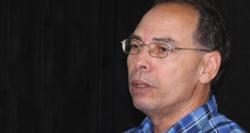

LIVE
Navigating the ‘mid-transition’ period of the low-carbon shift: The critical role of finance ministries12:30 pm EDT - 2:00 pm EDT
Past Event
12:30 pm - 2:00 pm EDT
1775 Massachusetts Ave., NW
Washington, DC
Morocco has often been hailed as a model for democratic reform in an otherwise authoritarian region. In order to understand better the progress Morocco has undergone since the 1990s, when it started on the path of democratic reform, the Saban Center’s Patkin Visiting Fellow in Arab Reform, Maâti Monjib, led a policy luncheon discussion regarding the various advances and obstacles associated with Moroccan democratization.
Monjib opened with a description of Morocco’s political history from its independence to present day, breaking the era into three distinct periods: 1956-1960, a period of shared power between the palace and the Mouvement National (nationalists); the “Iron-Fist years” from 1961-1991; and finally 1991-2009, which has proven to be a period of overall political liberalization with fluctuations in the degree of reform. This final period, the focus of Monjib’s presentation, has consisted of successes and failures, particularly in regard to two categories.
The first category Monjib discussed encompasses both political and constitutional reforms. Among the positive reforms Monjib mentioned was the recognition of human rights in the preamble to Morocco’s Constitution (adopted in 1996), as well as an increase in individual freedoms. However, Monjib pointed out, the same period has seen a high degree of interference from the Interior Ministry and Intelligence Services, aimed at managing the political sphere and enlarging the gap between Islamists and secularists within the polity so as to quash the prospect of a robust and unified democratic opposition.
The second category Monjib addressed encompasses both social and cultural changes that have occurred since the start of the political reforms. In reference to women’s rights, Monjib said that Morocco has made formidable progress thanks largely to the strong feminist movement whose demands were met by King Mohammed VI. An example of such progress was the Mudawana reform – a 2003 law designed to grant women equal rights in the family and improve their status. However, in 2008 when the king removed some of Morocco’s reservations to aspects of the Convention on the Elimination of All Forms of Discrimination against Women, the move generated a backlash to the reforms from some conservatives within the regime and certain Islamists.
The presentation concluded with Monjib articulating several reform goals and time horizons for achieving these goals. The most urgent of the reforms Monjib mentioned include implementing the institutional recommendations of the Truth Commission, or Instance Equité et Reconciliation (IER), which Monjib believes would open the path toward a true separation of powers. Although the IER has played a positive role in the reconciliation between a large part of political society and the state, in order for the Commission to be truly effective, its institutional recommendations, which were accepted by the king, must be implemented. Other urgent reforms span a variety of topics, including education, poverty, and various environmental concerns, while longer-term goals include several constitutional modifications.
During the question and answer portion of the luncheon, many participants queried Monjib on what actions the international community should take in order to better assist Morocco in its reform efforts. In response, Monjib emphasized two different strategies the international community should consider. First, he suggested, countries and blocs of countries should decouple their democracy promotion efforts from the promotion of their economic and strategic interests. Next, he stated, the international community should not view Moroccan development in a regional, comparative light. Instead, the international community should track Moroccan progress and failure independently and over time, so as to gauge better its growth and potential. Western countries, Monjib said, tend to overstate Moroccan progress when it is measured relative to its less democratic peers.


Madiha Afzal, Marsin Alshamary, Aslı Aydıntaşbaş, Pavel K. Baev, Sarah A. Binder, E.J. Dionne, Jr., Vanda Felbab-Brown, William A. Galston, Sharan Grewal, Ryan Hass, Tanvi Madan, Suzanne Maloney, Gian Maria Milesi-Ferretti, Itamar Rabinovich, Natan Sachs, Jaganath Sankaran, David Wessel, Andrew Yeo
April 15, 2024

Suzanne Maloney
April 8, 2024

Vanda Felbab-Brown, Jeffrey Feltman, Sharan Grewal, Steven Heydemann, Marvin Kalb, Patricia M. Kim, Tanvi Madan, Suzanne Maloney, Allison Minor, Bruce Riedel, Natan Sachs, Valerie Wirtschafter
April 5, 2024